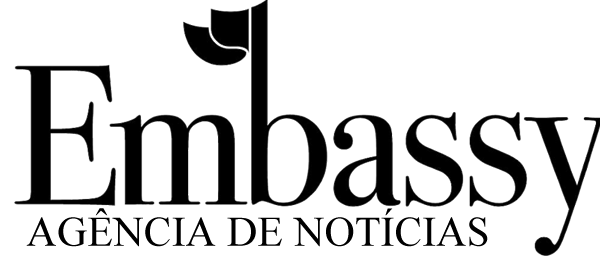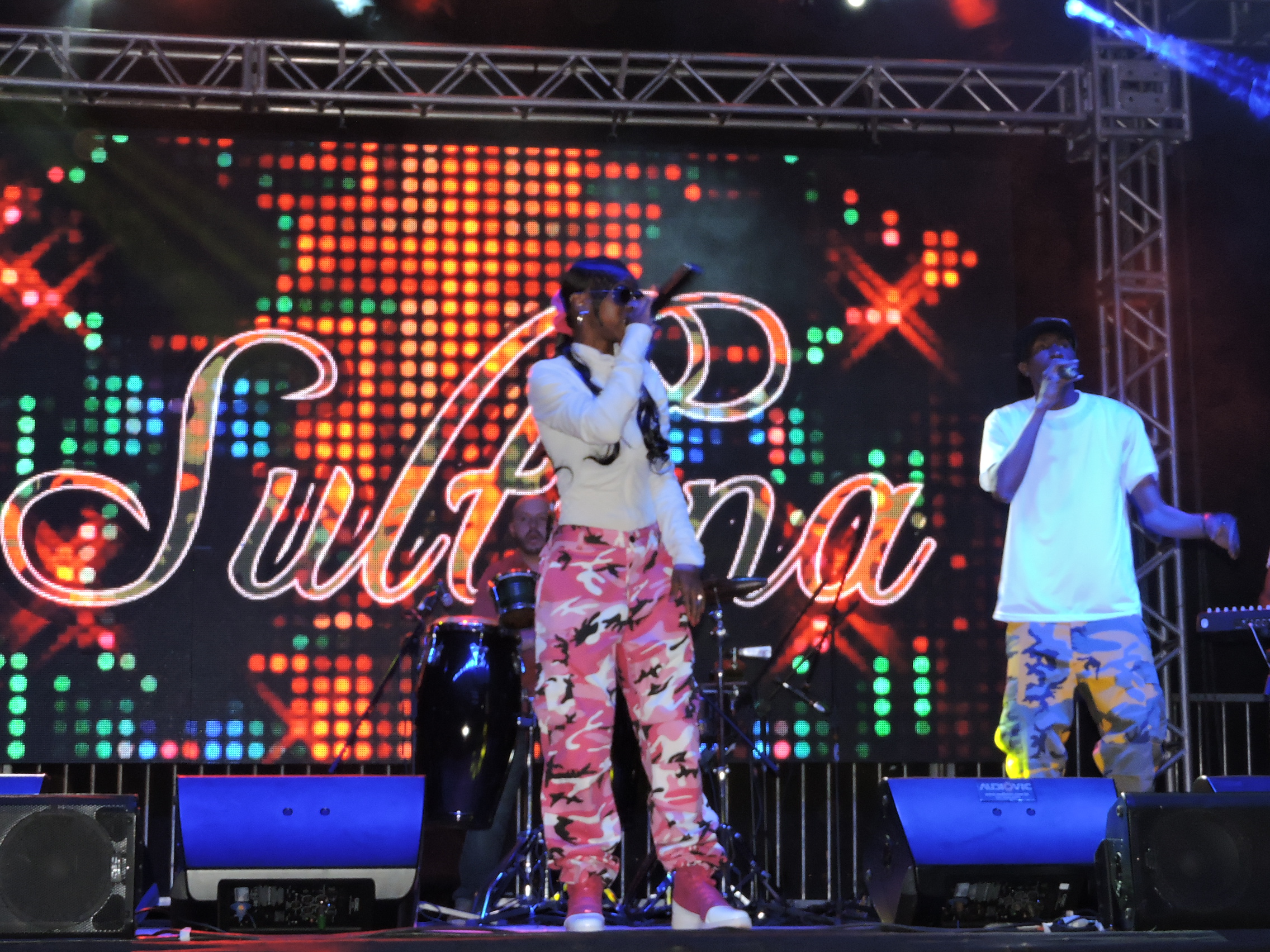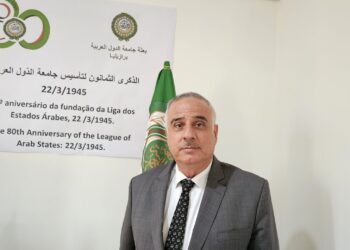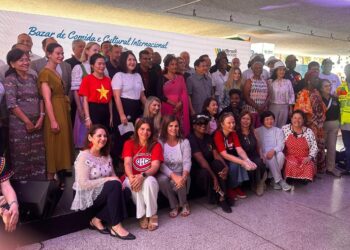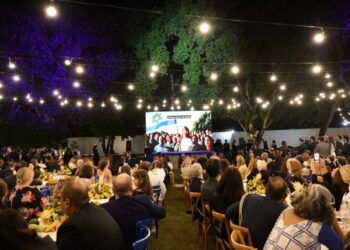[:pb]
The Colombian population have celebrated the national date with a lot of partying all over the world. In Brasília, the celebration was realized in the Colombian embassy headquarters on the last July 21, one day after the official date, July 20. The ambassador Alejandro Borda have received the Colombian community, the diplomatic corps, authorities and friends with typical dishes, drinks and the famous coffee, considered the best coffee in the world. The music was under the responsibility of the Sultana group, that came specially for the event. They are famous in Colombia for mixing salsa, hip-hop and electronic music. In his speech, the diplomat thanked Brazil and the international community for the support in the ceasefire in the armed conflicts that lasted 60 years; he also highlighted the importance of the bilateral deals and investment in tourism and education.
The ambassador Alejandro Borda cited, in speech to the guests, the cooperation deals between Brazil and Colombia in the sectors of agriculture, family agriculture, telecommunications and infrastructure. “There are 50 Brazilian companies based in Colombia and also Colombian companies that are based here in Brazil, such as the ones that are functioning in Petrolina, Pernambuco”, said the ambassador. Alejandro Borda affirmed that the Colombian government wants to “increase the trade flow and facilitate and diversify the relations in tourism”. “The tourism sector have grown 60% in the last four years, thanks to the direct flights and to the joint effort of the Colombian and Brazilian governments”, he discoursed.
Alejandro Borda also affirmed that he wants to strengthen academic cooperation deals with Brazil. Today, according to him, around 450 Brazilian students are taking Spanish courses in Colombia. About the Olympic Games, in Rio de Janeiro, in August, the ambassador guarantees that Colombia “will have an historical representation, with the participation of several medalists”. The ambassador have yet announced the opening of the Colombian House, in Rio de Janeiro, where the public that is going to Rio de Janeiro to watch the games can buy craftwork, watch to artistic and cultural presentations and even taste the Colombian coffee.
History – Colombia, administratively, was born with the creation of the Viceroyalty of New Granada, a colonial institution whose center in Bogotá, controlled Colombia, Panamá, Venezuela and Ecuador. The country has a valuable architectural and cultural colonial past that conserves itself in many cities and villages. Influenced by the Spanish metropolis, it have developed its economy and economical centralization; thus, the Viceroyalty of New Granada saw a bourgeois class growing, the Criollos, who have conquered more and more space in the colonial politics, started to manifest against the intensification of taxes and limitations of the Spanish Crown, from the first decade of the nineteenth century, promoting revolt among the local bourgeoisie.
People following liberal ideas of Enlightenment, the Criollos taking up arms, Napoleon invading Spain and putting a king whose own metropolitan people did not obey; the mass rebellion in the unhappy colony was inevitable. Riots erupted, not only in Colombia, but in several layers and regions. The effective independence came with Simón Bolívar, the Liberator, a member of the Board of Resistance against King Joseph Bonaparte, brother of Napoleon, whose own people did not recognize as their King.
Simon, a visionary, was influenced by the Enlightenment and humanitarian ideas of his former tutor, began their campaigns in Venezuela, dragging all of Latin America in a war of independence that have culminated at the end of the Spanish colonies in the Americas. In 1810, the provinces of current Colombia began to form their government seals: Cartagena on May 22, Cali, Socorro and Pamplona on July 3, and, on July 20, Santa Fe (Bogotá).
Colombianos celebram 206 anos de Independência
Em todo o mundo, a população colombiana comemorou a data nacional com muita festa. Em Brasília, a celebração foi realizada na sede da embaixada da Colômbia, no último dia 21 de julho, um dia após a data oficial, 20 de julho. O embaixador Alejandro Borda recebeu a comunidade colombiana, a comunidade diplomática, autoridades e amigos com comida e bebida típicas do país e o famoso café colombiano, considerado o melhor do mundo. A música ficou sob a responsabilidade do grupo Sultana, que veio especialmente para a festa. O grupo é famoso na Colômbia por misturar salsa, hip-hop e música eletrônica. Em seu discurso, o diplomata agradeceu ao Brasil e à comunidade internacional pelo apoio no cessar fogo nos conflitos armados que duraram 60 anos; também ressaltou a importância dos acordos bilaterais, do investimento no turismo e na educação.
O embaixador Alejandro Borda citou, no discurso para os convidados, os acordos de cooperação entre Brasil e Colômbia nos setores de agricultura, agricultura familiar, telecomunicações e infraestrutura. “Existem 50 empresas brasileiras sediadas na Colômbia, e empresas colombianas aqui no Brasil, como algumas que funcionam em Petrolina, Pernambuco”, disse o embaixador. Alejandro Borda afirmou que o governo colombiano quer “aumentar o fluxo comercial e facilitar e diversificar as relações na área de turismo”. “O setor turístico cresceu 60% nos últimos quatro anos, graças aos voos diretos e ao trabalho conjunto do governo brasileiro e colombiano”, discursou.
Alejandro Borda afirmou também querer “estreitar” acordos de cooperação acadêmica. Hoje, segundo ele, cerca de 450 estudantes brasileiros estão fazendo cursos de espanhol na Colômbia. Quanto aos Jogos Olímpicos, no Rio de Janeiro, em agosto, o embaixador garante que a Colômbia “terá uma representação histórica, com a participação de vários medalhistas”. O embaixador anunciou, ainda, a abertura da Casa da Colômbia, no Rio de Janeiro, onde o público que for para os jogos poderá comprar artesanatos, assistir a apresentações culturais e artísticas, além saborear o café colombiano.
História – A Colômbia como centro administrativo nasceu com a criação do Vice-Reino da Nova Granada, uma instituição colonial cujo centro em Bogotá controlava tanto a Colômbia quanto o Panamá, Venezuela e Equador. O país tem um valioso passado colonial arquitetônico e cultural que se conserva em muitas cidades e povoados. Desenvolvendo sua economia e centralização econômica influenciada pela metrópole espanhola, o Vice-Reino da Nova Granada viu o surgir de uma classe burguesa, os criollos, que conquistavam cada vez mais na política colonial quando começaram a protestar a partir da primeira década do século XIX contra a intensificação dos impostos e limitações da Coroa Espanhola, promovendo revolta entre a classe burguesa local.
O povo seguindo ideias liberais do Iluminismo, os criollos pegando em armas, Napoleão invadindo a Espanha e pondo um Rei cujo próprio povo metropolitano não obedece; a rebelião em massa na insatisfeita colônia era inevitável. Revoltas explodiram, não só na Colômbia, mas de diversas camadas e regiões. A independência efetiva veio com Simón Bolívar, o Libertador, membro da Junta de Resistência contra o rei José Bonaparte, irmão de Napoleão, cujo próprio povo não reconhecia como Rei.
Simón, visionário, influenciado pelas ideias iluministas e humanitárias de seu antigo tutor, começou suas campanhas na Venezuela, arrastando toda a América Latina para a guerra de independência, que culminaria no fim das colônias espanholas nas Américas. Em 1810, as províncias da atual Colômbia começaram a formar suas Juntas de Governo: Cartagena em 22 de maio, Cali, Socorro e Pamplona em 3 de julho, e, em 20 de julho, Santa Fé (atual Bogotá).
[:]

